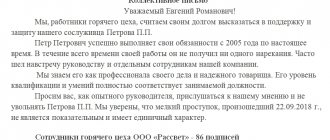Registration period for a written appeal from citizens according to the law
The settlement of all issues relating to written appeals to executive and state authorities are formulated in Russian legislation within the framework of No. 59-FZ “On the procedure for considering appeals from citizens of the Russian Federation”.
This legislative act also considers provisions regarding a clear definition of the time frame for receiving a response to submitted complaints, applications and proposals, since the infringement of the rights in connection with which citizens file an appeal often cannot be delayed and requires an early resolution.
The concept of registration period for appeals covers the maximum possible time period during which the appeal must be processed as an incoming document and accepted for consideration. This period is limited by law to 3 days.
Important: in a situation where a document is forwarded to other authorities, registration can occur after the document arrives at the competent authority or official, which can take up to 7 days.
As suggested by the norms of Part 1 of Art. 8 Federal Law No. 59, if a citizen has a need to contact a government agency, municipal body or a certain official competent in terms of considering the problem raised, it is necessary to write a written appeal - a statement, complaint or proposal.
This document is submitted to the reception office of the municipality or government agency, where the person authorized to receive incoming documentation must register the application within no more than 3 working days from the moment of submission by the citizen, as provided for in Part 2 of Art. 8 of this law.
- In a situation where, during the study of the essence of the issue raised in the appeal, it turned out that the problem lies outside the competence of the service, structure or person to whom the citizen addressed, this document must be forwarded to the body competent to consider this issue within a period not exceeding 7 days, as indicated in Part 3 of Art.
8 Federal Law No. 59. In this case, the citizen who submitted a written appeal must receive notification that his application has been redirected to another structure. - If the problem raised in the appeal concerns several government bodies or structures at the same time, then within 7 days a copy of the appeal is sent to all authorities, as stated in Part 4 of Art. 8 Federal Law No. 59.
- Questions regarding violations in the field of migration legislation should be considered and redirected in accordance with Part 3.1 of Art. 8 Federal Law No. 59 within a maximum of 5 days to the leadership of the local unit of the internal affairs bodies and the head of the executive branch - the mayor, governor or head of the territorial unit.
Exceptions that make registration of an appeal impossible are situations provided for by the provisions of Part 4 of Art. 11, namely:
- the appeal is written or printed in such a way that it is impossible to understand its essence due to difficulties in understanding individual words and sentences;
- if the complaint, proposal or statement as the reason for the appeal is stated in such a way that it does not allow one to understand the essence of the document and state the citizen’s demands in terms of restoring his rights and freedoms.
If a citizen’s appeal contains a complaint against a state or municipal structure, as well as against an official who committed an action or inaction raised in the paper, and these same persons or bodies must consider this issue, then such an appeal is not accepted in accordance with the norms of Part 7 of Art. 8.
In this case, the citizen is returned a written appeal by hand or by mail with a detailed explanation of the current conflict and a recommendation to go to court to resolve the issue raised.
Deadlines in the courts
Those citizens who decide to appeal the decisions of state bodies or local governments, as well as the actions or inactions of officials working in them in court, should be prepared for the fact that the litigation may drag on. This is due to the possibility of considering a dispute alternately in several instances.
According to the CAS of the Russian Federation, 2 months are allotted for consideration of a dispute in the court of 1st instance, if it is a district court or regional and equivalent courts. But in the Supreme Court of the Russian Federation, a case can take 3 months to resolve. In particularly complex cases, it is possible to extend the established period for another 1 month.
After the court of first instance makes a decision, another month (but no more) may pass before filing an appeal, for consideration of which 2 months are allotted to regional and equivalent courts and 3 months to the Supreme Court of the Russian Federation. A cassation appeal can be filed within 6 months after the appealed decision comes into force. And the consideration of cassation in a cassation court lasts 2 months. The possibility of extending the period for consideration of a case in cassation also exists, therefore, if the case is particularly complex, the chairman of the court can do this, but not more than for 4 months.
How long is the response period for an application, complaint or suggestion?
The law also establishes deadlines for consideration of appeals, after which it is necessary to submit a response about the essence of the problem raised to the person who sent the complaint, application or proposal. The terms of consideration, as well as the terms of registration, are prescribed in the provisions of the law in order to optimize and speed up the restoration of the legitimate rights of citizens and to fight back the dominance of bureaucratic delay.
As the legislation suggests in Part 1 of Art. 12 Federal Law No. 59, the duration of consideration of the problem raised in a written appeal from a citizen should not exceed 30 days from the moment this document is assigned an incoming number in a municipal or state structure.
If the appeal is submitted to the head of local executive power and concerns a violation of the law on migration, then according to the instructions of Part 1.1 of Art. 12, the consideration period is reduced to 20 days from the date of registration of the application.
Difficulties of marriage
Difficulties may be associated with the busy schedule of the registry office itself in a particular city. And this is not always to the advantage of newlyweds. Given this fact, it is worth finding out about this in advance. Also about whether they are among those citizens whom the state does not allow to take this step. But in general there is nothing difficult about submitting an application for consideration.
How long does it take for the registry office to process an application? — It all depends on the season, i.e. There are periods when the number of weddings grows many times, and from a ready-made package of documents. But everything is in order.
First, you need to submit an application. Newlyweds can do this by coming to the authorities registering the status of citizens in person and filling it out. How long does it take for the application to be reviewed by the registry office? - Very little. On the same day, the documents will be accepted and the wedding day will be set.
Documents can also be submitted electronically. In Moscow, most institutions have their own pages, where it is possible to do this without leaving home. Procedure:
- You must register on the website www.gosuslugi.ru (a single portal of government services) by filling out your personal data.
- Afterwards, it is important to enter the code that will activate your personal account. The code will be sent to the email address or phone number provided.
- After registration is completed, click the “get service” button. Here we select the document we need and fill it out. Choose a date. It cannot be booked for the first ten weeks.
- From the moment the application is submitted (it is considered preliminary), seven days must pass for its official acceptance. After the first week, there will be a notification about when the bride and groom should appear at the registry office with prepared documents.
Although when submitting online, the period for consideration of the application at the registry office is longer, but for modern life this is a very convenient form. On the sites you can also get the necessary information on any issue related to the work of the registry office. Also, through State Services it is possible to find out telephone numbers to receive clarification of various nuances of your question.
Receiving a reply letter
Consideration of a complaint or proposal on the merits of the problem raised logically ends with the adoption of a specific decision or resolution, of which the person who filed the appeal must be notified. So in subparagraph 4 of part 1 of Art. 10 Federal Law No. 59 indicates the obligation of an official, municipal or state structure to give a written response to the essence of the problem.
According to the instructions of Part 3 of Art. 10 this document must be signed by the management of the structure responsible for resolving the issue. Then, as part 4 of Art. 10 the document is sent to:
- by email – if the request was submitted in the form of an electronic document;
- through the post office - if the request was submitted on paper;
- for publication on the structure’s website if the problem concerned an appeal of a court decision in relation to an indefinite number of persons.
The answer is not given if the appeal falls under the provisions of Art. 11, namely:
- written by anonymous;
- contains an attempt to appeal the court decision;
- there are insults and threats to the official and his relatives;
- the writing is illegible or unclear;
- the essence of the complaint, appeal or proposal is not clear;
- an issue is repeatedly raised that was answered earlier, but the circumstances of the situation have not changed;
- the answer to the question has already been published in the media, including the Internet portal of the structure competent in relation to the appeal;
- consideration of the appeal reveals a secret of a national scale;
- previous obstacles to consideration of the issue have been removed.
Is it possible to speed up the process?
You can make the processing of your application at your chosen bank faster. To do this, it is advisable to become a salary client of this financial institution, and you can get a mortgage by providing only two documents.
Also, the borrower’s application will be considered faster if he has previously made deposits here, taken out small loans and repaid them on time, and has an excellent credit history. Accordingly, it is advisable to apply for a mortgage loan from the bank that previously served this client.
You can speed up the process using the documents provided. Type 2-NDFL certificates have a great influence on the speed of consideration of the application. In this case, the client verification will be carried out faster.
But if the applicant submitted documents that included a certificate of income received in a bank form or in free form, the verification will take much longer. The lender must make sure how solvent and reliable the client is.
Such documents may be fake, so they are checked more carefully.
What to do if a violation is detected?
The fact that the deadline for considering an appeal is violated follows from the law and is determined by the duration of receiving an answer to the question:
- if the question is considered without forwarding and information requests, the response must be signed no later than 33 days from submission to the office, and the letter must arrive by mail with a postmark no later than this date;
- when redirecting a document, the period increases to 43 days: 3 registration days, 7 days for forwarding, 3 registration days with the competent structure and 30 days for studying the problem;
- if the progress of the case is accompanied by numerous requests and occurs with an extension, then the deadlines increase to 73 days, due to an additional extension of 30 days.
An appeal that is not considered on time can lead to unreasonable costs for filing a complaint, cause damage to property or the moral well-being of a citizen. In this regard, the law in Art. 16 gives a person the right to apply to the judicial authorities for payment by officials or organizations that delayed the appeal, a sum of money that will compensate for the losses incurred.
A civil rights case - what is it?
A case under compulsory motor liability insurance is opened by an insurance company when it receives an application from a victim in an accident to receive compensation for damage caused. In addition to the application, the insurance case will be accompanied by the necessary documents and an expert’s opinion after an inspection of the damaged vehicle.
Within the time limits specified by law, the insurer reviews the submitted claim and decides whether the incident is an insured event, and if so, what the amount of compensation should be. After this, the victim either receives a refusal, or is charged money or is given a referral for repairs.
An insured event is an adverse event defined by an insurance contract or law, after the occurrence of which the insurer is obliged to pay compensation for damage to the policyholder, beneficiary, or insured person. According to compulsory motor liability insurance, an insured event will be the commission of an accident by a driver included in the policy or by any person admitted to driving, if the contract is concluded “without restrictions,” as a result of which damage is caused to the property or health of third parties. In order for an accident to be recognized as an insured event, several conditions must be met:
- Availability of a valid MTPL insurance policy, the driver is included in the policy (how to find out if the MTPL insurance policy is valid?).
- The accident occurred while driving. That is, if the culprit caused damage to someone else’s car, for example, by opening the door in a parking lot, then this is not an insured event.
- As a result of the incident, harm was caused to third parties.
The payment under the auto insurance policy is received by the victim in an accident; the culprit will have to repair his car himself, despite the fact that it was he who paid for the policy and entered into an agreement with the insurance company.
Who reviews applications?
In this procedure, banks involve several of their departments simultaneously.
- Applications are subject to automatic scoring, and based on its results a certain amount of points will be assigned. If it does not reach a certain value, the client will be refused. In case of higher scores, the application will be sent to the next stage of consideration with a CI request. If it is bad, the bank will refuse to provide a mortgage loan.
- After scoring, the lender’s security service handles the application; it checks it for authenticity and relevance by submitting requests to the Federal Migration Service, the tax service, the Pension Fund of the Russian Federation, the borrower’s employer, guarantors, co-borrowers, etc.
- The application undergoes an analysis of the applicant’s documents in the analytical department with a forecast of the loan recipient’s ability to repay the mortgage throughout the entire loan term.
- The risk department assesses the risk of non-payment of the loan, the stability of the borrower’s work, etc.








